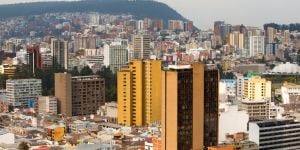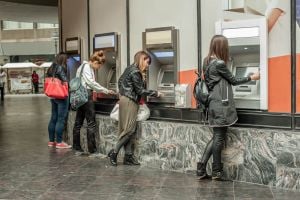How Many Bank Cards Should an Expat Have on Hand?
Subscribe to the topic
Post new topic
I read the following on Cota FB. Some years back, it was almost unfathomable to me the idea of not having a u.s. bank account. But, in recent years I have seen some threads on GP of people depositing their SS checks in their Ecuador account. Then there is a guy in Quito who had to close his account because his bank wouldn't allow a foreign address anymore. Personally, I have had some problems using my U.S Global Mail box with some accounts because it is a "commercial address" rather than a "residential address".
Is there anyone in the cotacachi community that has access to a US bank account that incorporates Venmo or Zelle or any of the other money transfer tools. My daughter wants to wire money to us and we no longer have a US bank account.
We sent money to our lawyer from US to Ecuador last week by western union.. very easy and he picked it up the next day
@cccmedia … how do you work around travel, i.e. hotels and flights without a credit card?
To respond to the OP's initial question,
I have two Ecuadorian bank debit cards (JEP and Banco Pichincha). Two debit cards from the U.S. (Ally Bank and Capital One). Finally, I have two Bank of America visa credit cards. One is a Travel Rewards card which doesn't charge me for foreign transaction fee. The other is a domestic cash rewards card. I had thought of canceling one of my Bofa credit cards and combining the credit availability. However, I decided to keep both, partially in case of losing one and partially because supposedly cancelling credit cards hurts your credit score.
My U.S. banks have as my primary address a U.S. Global mailbox based out of Texas. I am not sure that I could have opened those accounts with this mailbox as I probably could 10 years ago. Paypal raised a stink about 5 years ago wanting a residential address, but they backed down.
P.S. As for Fintech accounts, I have XOOM, Remitly and Western Union. I only used the Western Union once to send myself $50 as a test. The disadvantage with Western Union was I had to pick up the cash, instead of depositing it in my Pichincha Account. Money Gram will deposit to your Ecuadorian bank account; the only kicker with them, however, is they want your first transfer to be initiated from the U.S., and no, a VPN didn't work as a workaround.
@N.Barley … Similar situation for me. I was trying to cut the cord and get rid of my Canadian cell phone and Blue Cross extended health care coverage from Canada, and switch everything over to Ecuador. Just wanted to maintain my free Canadian / provincial health care (GO CANADA 🇨🇦🇨🇦🇨🇦🇨🇦🇨🇦🇨🇦) for when I (briefly) return to my hometown, maintain property in Canada, and Canadian residency for retirement benefit and tax reasons… However…
I need to maintain two Canadian bank accounts (one for annuity income, and one for general savings and international transfers; keep them separate people!) and a cell phone plan separate from my Ecuadorean Claro account; Both tied to a Canadian address, in order to receive security verification texts for use of credit cards (sounds impossible / impractical to get a credit card in Ecuador), receive annuity income and eventually retirement benefit deposits and transfers, Revenue Canada tax security verification texts for online transactions and tax document submissions and refunds… blah blah blah
Thank goodness the cost of living is so relatively affordable in Ecuador… and you wouldn’t believe how long I couldn’t stop smiling after going to the dentist here and paying $35 for an extensive cleaning after not having seen Dentist for over five (eight?) years!! (I know horrifying… But shite happens even pre-Pandemic lol… 😝🤓👹)
@rkg695
I have managed to do without a U.S. cell plan, although I need two calling apps (Google Voice and Groove IP), since google voice doesn't work with one of my banks. I wish more financial institutions gave the option of using an authenticator app and/or Yubico security key for 2FA.
I use Xoom for small international bank transfers. I use Western Union for international cash transfers. For large international bank transfers, wire transfer done in person during regular banking hours. For purely digital where I don't expect to use the money except for digital things, PayPal.
I have bank accounts in the US and Ecuador.
I have heard of people who have used the services of a lawyer or CPA to help establish a permanent address and trust in a low or no tax state in the US.
I wish more financial institutions gave the option of using an authenticator app and/or Yubico security key for 2FA.
Ironically, the day after saying that, my Bahamas based broker, Trade-Zero, which has a whopping $500 doing nothing, sent an email message telling me MFA is now available. I guess the acronym MFA is replacing 2FA since there are multiple ways to get your security code. By the way, I opened the Trade Zero account as a resident of Ecuador after being rejected by Interactive Brokers, because I effectively lied about being a resident of the U.S.
Multi-Factor Authentication (MFA) is now available for any of your trading platforms.
MFA adds an extra layer of protection to your account, in case your password is stolen, by requiring a verification code to be used with your password to log in. To help prevent unauthorized access to your trading account, we strongly recommend that you activate MFA.
Articles to help you in your expat project in Ecuador
 Opening a bank account in Ecuador
Opening a bank account in EcuadorA few years back, an expat would just breeze into an Ecuadorian bank, flash their passport and a bank account ...
 How to Access Your Money in Ecuador
How to Access Your Money in EcuadorI've noticed that there's a lot of information on the Internet about how Americans access funds from ...
 Food in Ecuador
Food in EcuadorWhat kind of food will you find in restaurants, cafes, and private homes in Ecuador? Many restaurants in Ecuador ...
 Healthcare in Ecuador
Healthcare in EcuadorEcuador, as a fast-developing nation, has laws that are constantly evolving, but one thing is certain: the ongoing ...
 The Working Holiday Visa for Ecuador
The Working Holiday Visa for EcuadorEcuador is truly a paradise for adventure and nature lovers, and thanks to the Working Holiday Visa program, they ...
 Work in Ecuador
Work in EcuadorEcuador is famous as a retirement haven. But you might not want to wait until retirement age to move there and ...
 Family and children in Ecuador
Family and children in EcuadorFamily is everything to an Ecuadorian. The extended family unit is the most important aspect of life in Ecuador, ...
 Leisure activities in Ecuador
Leisure activities in EcuadorYou have made it to Ecuador, now what is there to do in your free time? A lifetime in Ecuador isn't enough time to ...
Find more topics on the Ecuador forum



